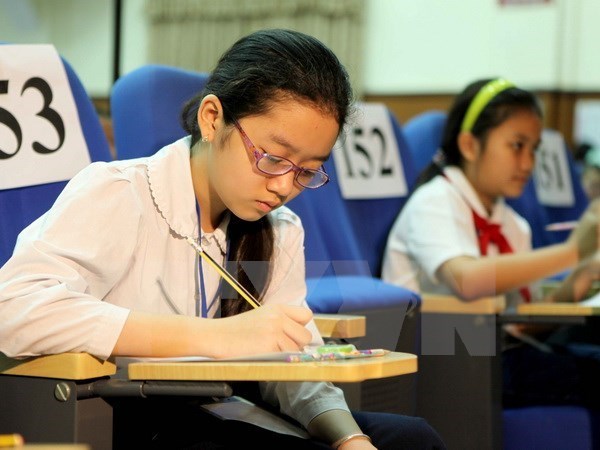Vietnam ranks first among six Southeast Asian nations in primary student learning outcomes
 Illustrative photo. (Source: VietnamPlus)
Illustrative photo. (Source: VietnamPlus)
Hanoi (VNA) – Vietnam ranks first among Southeast Asian countries in terms of primary school student learning outcomes under the Southeast Asia Primary Learning Metrics (SEA-PLM) programme.
The SEA-PLM 2019 Main Regional Report, developed by the Southeast Asian Ministers of Education Organization (SEAMEO) and the United Nations Children's Fund (UNICEF), were announced at a virtual SEAMEO conference on December 1.
Accordingly, among the six participating countries, namely Vietnam, Laos, Cambodia, Malaysia, Myanmar and the Philippines, primary school students in Vietnam ranked first in all three competencies surveyed, namely Reading, Writing, and Mathematics.
Specifically, in the Reading domain, Vietnamese students showed the highest average competency level of 6/6, categorized as being able to "understand texts with familiar structures and manage competing information." The percentage of Vietnamese students achieving the sixth level of competency is 82 percent. Malaysia ranked second with 58 percent of students achieving the sixth level. The percentages of the remainder were all below 10 percent.
In terms of Writing, Vietnamese students had an average capacity of 6 out of 8. Twenty percent of them qualified for Band 8, categorized as being able to "write cohesive texts with detailed ideas and a good range of appropriate vocabulary." According to the report, these children may be able to transition well through to secondary education, and may possibly be on the right track to meet the challenges of a 21st century skills-based curriculum. This rate in the remaining countries was 2 – 4 percent.
In Mathematics, Vietnamese students had an average competency level of 8 out of 9. The percentage of those with the highest level of competency (level 9) was 42 percent. The rates among the remainder were all below 10 percent.
 Vietnamese Deputy Minister of Education and Training Nguyen Van Phuc (centre) attends the virtual conference of the Southeast Asian Ministers of Education Organization (SEAMEO) on December 1. (Photo: VietnamPlus)
Vietnamese Deputy Minister of Education and Training Nguyen Van Phuc (centre) attends the virtual conference of the Southeast Asian Ministers of Education Organization (SEAMEO) on December 1. (Photo: VietnamPlus)
The learning gap between urban and rural students as assessed by SEA-PLM has narrowed, with almost no difference remaining. However, students in mountainous and remote areas are still lagging far behind students from other regions.
There are no differences between learning outcomes of Vietnamese girls and boys in the Reading and Mathematics domains. However, girls are more likely to perform better than boys in Writing.
The report also found that higher levels of parental engagement were associated with higher reading, writing and mathematics scores in children. Half of the children reported that their parents motivate them to succeed in school (47 percent). Around one-third reported that their parents ask them about what they are learning in school (34 percent).
Vietnamese Deputy Minister of Education and Training Nguyen Van Phuc said the programme results will help his ministry identify immediate and long-term policies for the development of primary education. In particular, the ministry will focus on developing education for mountainous students, supporting ethnic minority students in difficult circumstances, and building a strategy to improve education for parents.
Launched in 2011, the SEA-PLM aims at assisting SEAMEO member countries to better measure and understand the learning situation of primary students according to both general and individual criteria, thereby helping countries improve the quality of their education system.
The 2019 report assessed learning outcomes of fifth grade students in six Southeast Asian countries to inform policy-making and ensure that all children achieve meaningful learning. It surveyed children’s proficiency in reading, writing and mathematics using the SEA-PLM, a regional large-scale student learning assessment program that aims to generate reliable data and evidence for monitoring learning outcomes across and within countries.
The programme collected children's and schools' responses through paper-pencil tests and questionnaires.
Data collection surveys were conducted in the six countries between January and November 2019. In Vietnam, they were done in 150 schools with 832 teachers, 4,837 students and 4,160 parents involved./.













